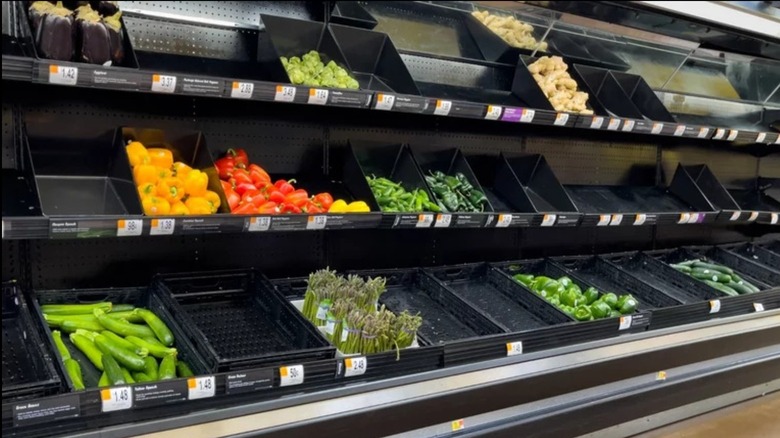Are Food Shortages Causing Another Health Crisis?
Food insecurity isn't a new problem, but following five years of stability, it became increasingly pervasive in 2020, according to ReliefWeb. In an August 2020 letter to the editor of the Journal, Trends in Food Science & Technology, Professor David de Paulo Farias, a faculty member in the Departments of Food Science and Food Engineering at Brazil's University of Campinas, pointed out what many of us now understand as a truism – which is that the pandemic and its related lockdowns wreaked "serious economic damage and threatened the availability of food in the world."
Although significant progress has been made in containing COVID-19, lockdowns continue to disrupt the global economy (via Financial Times), with ReliefWeb predicting that by 2030, another 30 million people across the globe may be facing hunger than would have "had the pandemic not occurred." Further, Russia's military aggression in Ukraine, which began in February 2022, has exacerbated the problem by disrupting the food supply chain, one of the effects of which is to create food shortages, which inflate global food prices and make food less accessible to more people, per Reuters. Then, of course, there's climate change, which Action Against Hunger identifies as one of the top three factors contributing to world hunger.
With 25,000 people dying daily from hunger, according to the United Nations, continuing food shortages clearly pose a threat to global health, per se. But they also set the scene for a global health crisis of a different kind.
Food shortages are part of a vicious cycle
The global food supply chain is a "complex network." However, one of the world's leading public health ministers, Peter Sands, the executive director of the Global Fund to Fight Aids, Tuberculosis and Malaria, has now gone on record with his assertion that Russia's military aggression in Ukraine, alone, has damaged that supply chain enough to ignite a whole new health crisis – one that goes beyond hunger, itself, according to AFP, via Barron's.
"Food shortages work in two ways," Sands told Reuters. "One is you have the tragedy of people actually starving to death. But second is you have the fact that often much larger numbers of people are poorly nourished, and that makes them more vulnerable to existing diseases," he said. And he's not talking about the diseases that are most commonly associated with malnutrition, such as anemia, per Paras Hospitals. Nor is he talking about a novel pathogen like avian flu, the latter of which, itself, has contributed to a steep rise in the price of eggs.
Rather, he's referring to diseases such as tuberculosis, which disproportionately affect the hungry, per the academic journal, Lung India. TB has been on the rise, according to Sands, who maintains mitigation requires governments to do a better job addressing world hunger. A 2014 study out of the University of Toronto would appear to concur, per ScienceDaily. If left unaddressed, further food shortages could result, according to Professor David de Paulo Farias.

